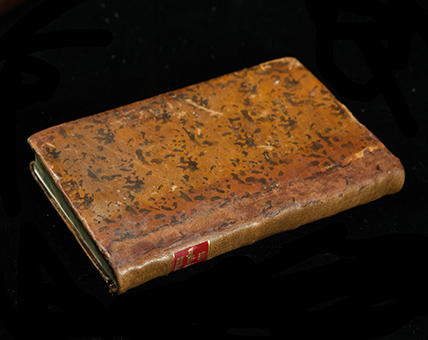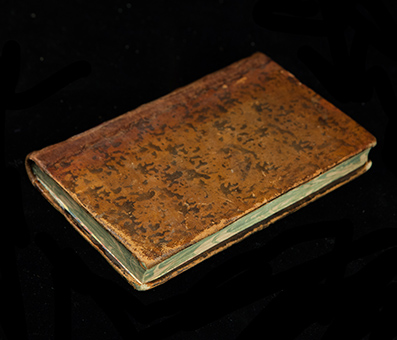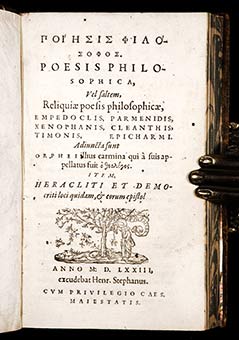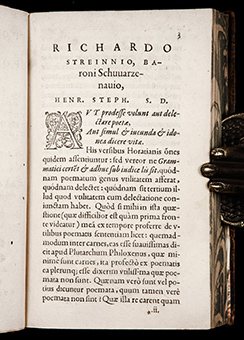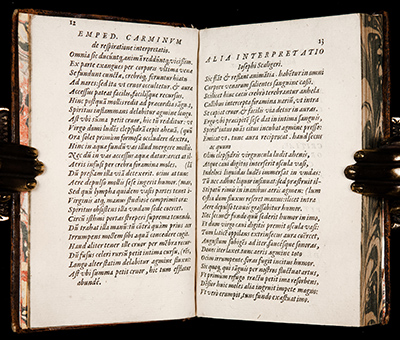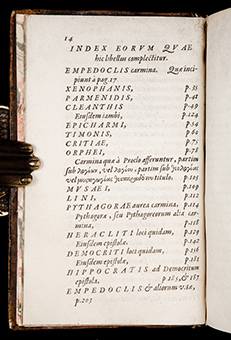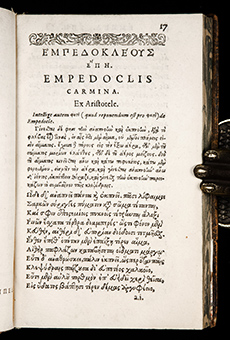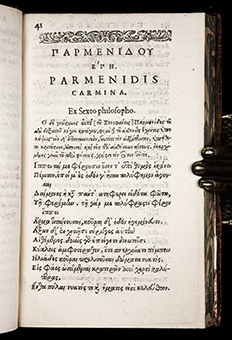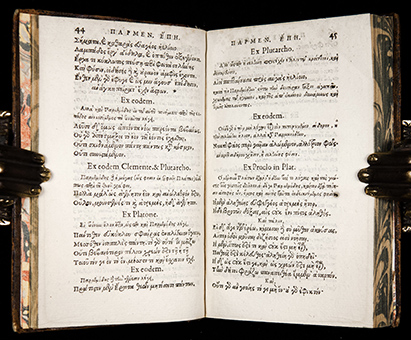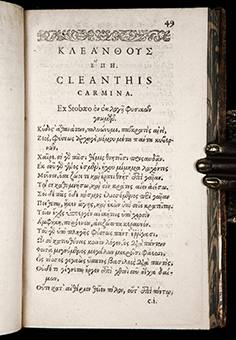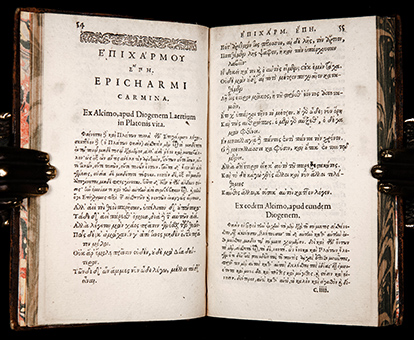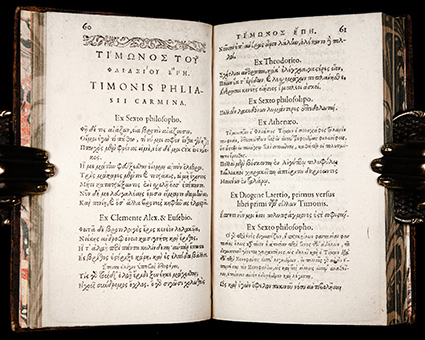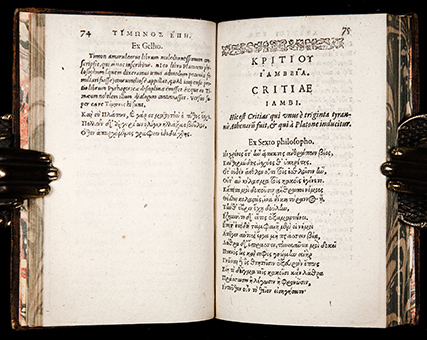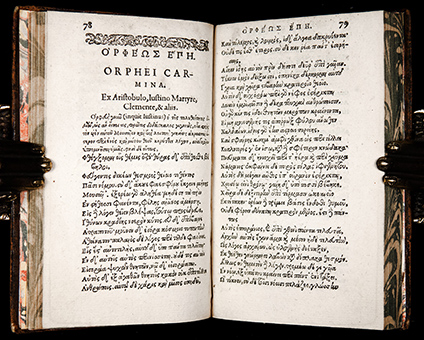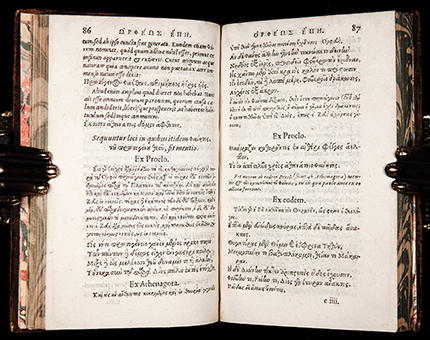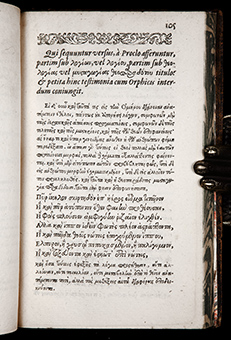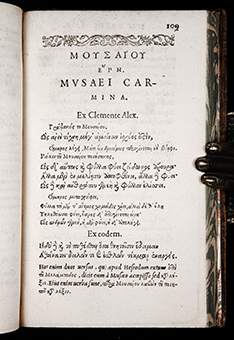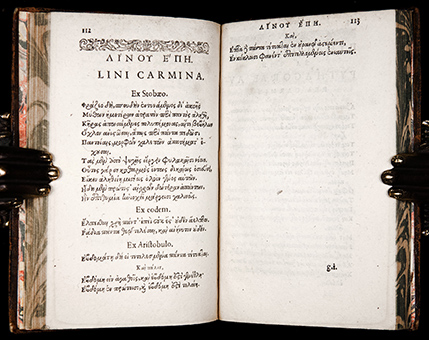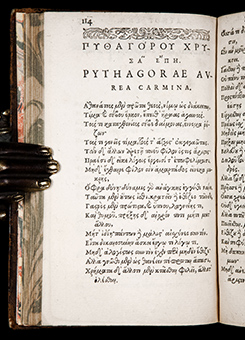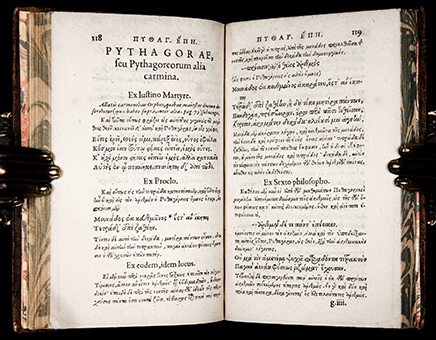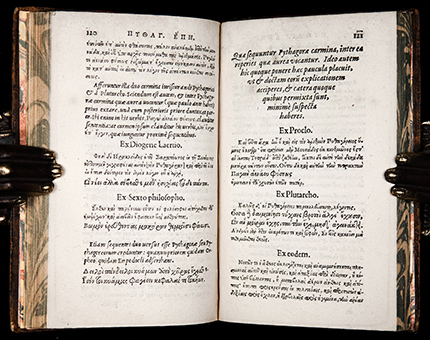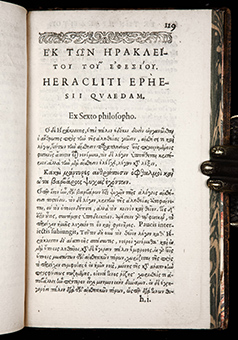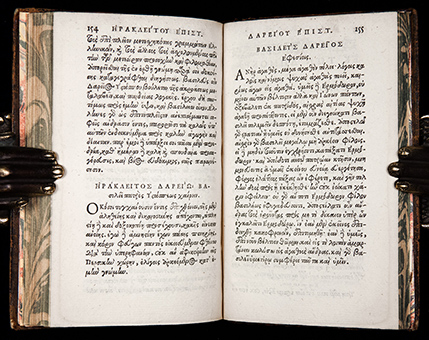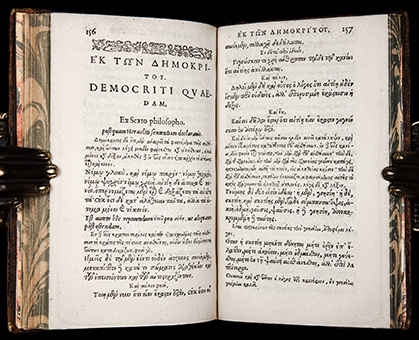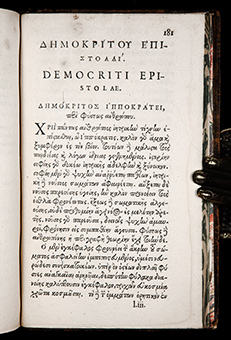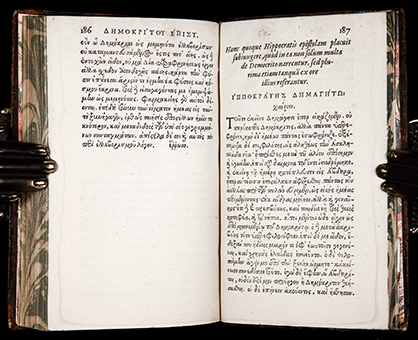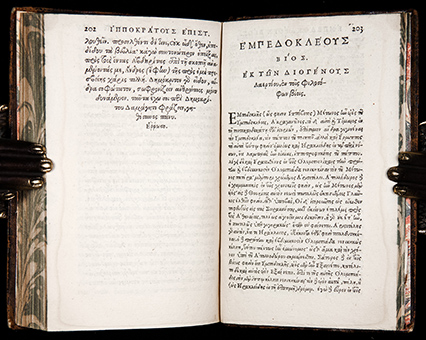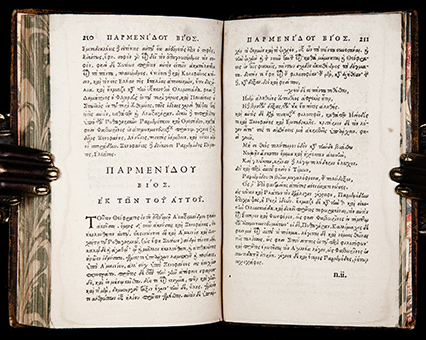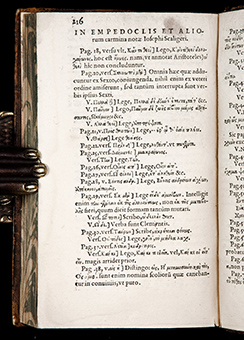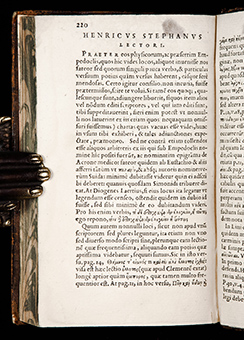

[Philosophy - Presocratic] [Greek Clasics] [Greek Imprints - Estienne Press]
Henri Estienne (ed.)
[Empedocles, Xenophanes, Parmenides, Heraclitus, Democritus, Pythagoras, et al]
Poesis philosophica, vel saltem, reliquiae poesis philosophicae.
[Geneva:] Henri Estienne, 1573.
$1,750 INQUIRE ✍
[Geneva:] printed by Henri Estienne, 1573. First Edition. Text chiefly in Greek (with occasional Latin). Edited by Henri Estienne, and with notes on Empedocles by Joseph Juste Scaliger.
"Modern interest in early Greek philosophy can be traced back to 1573, when Henri Estienne collected a number of Presocratic fragments in Poesis philosophica." (G. Stamatellos, Introduction to Presocratics, p.7)
As the foremost document of the revival of the Presocratic philosophy, this modest octavo is "a volume of major importance to the history of Western thought, which rightly belongs on the same shelf with the first editions of Plato and Aristotle." (Schreiber)
This influential collection, edited by the prominent Renaissance humanist printer Henry Estienne comprises the EDITIO PRINCEPS of the poems, epistles and fragments of the earliest known philosophers of nature (or scientists) of the Western tradition: Empedocles, Xenophanes, Parmenides of Elea, Heraclitus, Democritus, Cleanthes, Critias, et al. It also contains the Carmina Aurea, ascribed at the time to Pythagoras, the Hymns of Orpheus, and several epistles attributed to Hippocrates
"Since the sixth century CE, no one has quoted the presocratics - Anaximander, Herakleitos, Parmenides, Empedokles, and the others, except by recopying the bits already quoted by Simplikios and other, still earlier writers. The quotations were first gathered from the extant manuscripts a thousand years later by a master scholar, typographer, and printer, Henri Estienne the younger, he printed his anthology of early greek philosopher-poets in his own house in Geneva in 1573, under the title [Poesis Philosophica], [i.e.] 'philosophic poetry' or 'philosophic making'. This is the first printed edition of Parmenides and of half a dozen other Presocratics, including two of the earliest prose-poets in the literature of Europe: Herakleitos and Demokritos. In retrospect, ESTIENNE'S PRESOCRATIC ANTHOLOGY APPEARS TO BE ONE OF THE KEY TEXT IN THE HISTORY OF EUROPEAN THOUGHT." (Robert Bringhurst, The Fragments of Parmenides: The Poetry of Philosophy; In 'Everywhere Being Is Dancing: Twenty Pieces of Thinking', p.132-3)
"The Presocratics were the first to interpret the universe critically, through a unique combination of rational thought, intuition and observation, excluding any intervention of divine and supernatural powers. At the same time they appealed to man's conscience, elevating man to a free and responsible position. They posed the fundamental questions about "truth", "being", "becoming", laid the foundations for the tradition of critical - not dogmatic - investigation, without which science would not exist; and invented 'mental tools' for approaching the physical world, concepts which prevail in today's natural sciences, such as: universality of the physical laws, unity underlying seeming plurality; hidden ultimate reality underlying phenomena; interrelation and interconnection of all beings; man-observer as an inseparable part of the natural world; merging of opposite concepts; shift in emphasis from matter to process; inherent dynamic balance; mathematization of nature; atomic theory [...] symmetry; isotropy; measure; order; evolutionary process and natural selection.
Karl R. Popper has described this impetus as the 'Presocratic Enlightenment'; [he wrote]: 'As to the Presocratics, I assert that there is the most perfect possible continuity of thought between their theories and the later developments in physics; whether they are called philosophers, or pre-scientists, or scientists matters very little. [...] Few philosophers or scientists are aware of the influence exerted by some of the oldest ideas of Greek philosophy and Greek science upon our most advanced scientific theories: upon classical physics and chemistry, relativity, quantum theory, genetics, and even molecular biology." (C. J. Vamvacas, The Founders of Western Thought - The Presocratics, p.viii).
Henri Estienne based this edition on records and quotations from the ancient and Christian sources (following a method which centuries later, in 1903, was applied by Hermann Diels for his standard collection Die Fragmente der Vorsokratiker).
Henri Estienne (1528 - 1598), also known as Henricus Stephanus, was a prominent 16th-century French printer and classical scholar. He was the eldest son of Robert Estienne. Born in Paris, Henri displayed in his youth a genuine enthusiasm for Greek and Latin. As part of his general training, he undertook in his 19th year a long journey to Italy, England, and Flanders, where he busied himself finding and collating manuscripts for his father's press. He returned to Geneva in 1555, and by 1557 seems to have had a printing establishment of his own. In 1559 Estienne assumed charge of his father's presses, and proceeded to distinguish himself as a competent publisher, editor, and collator of manuscripts. His most celebrated work, the Thesaurus graecae linguae or Greek thesaurus, appeared in four volumes in 1572. Henry's editions of the Greek New Testament of 1576 and 1587 are also noteworthy. In 1578 he published a famous edition of the complete works of Plato with commentary.
This work was dedicated by Henri to Richard Strein von Schwarzenau (1538-1610), who seems to have been an intimate of Emperor Rudolf II and held a position at the Prague court; he was also an antiquarian and a student of nature. Strein's collections enjoyed fame in their day. In addition, he was a bibliophile who bought books for Rudolf and amassed a large library of his own which itself passed to the Habsburgs on his death.
Physical description:
Octavo, text block measures 160 mm x 96 mm. Bound in 18th-century mottled calf (rebacked in brown leather with a red, gilt-lettered label to spine); marbled endpapers and edges.
Paginated: 222, [2] pp. (blanks included in pagination).
Signature collation: *8 a-n8 [-b1 blank].
Complete (including three integral blanks: *8, b8, f4 and n8, but without blank b1).
Printed mostly in Greek types (some text in Latin). Woodcut printer's device on title-page, woodcut decorated initial on *2r and numerous woodcut headpieces.
Dedicatory epistle (in Latin) by Henri Estienne to Richard Strein von Schwarzenau on pp.3-10. Also includes "In Empedoclis et aliorum carmina notae" (in Latin and Greek) by Joseph Juste Scaliger (pp. 216-219) and Estienne's epistle (in Latin) to the reader "Henricus Stephanus lectori" (pp. 220-222).
Condition:
Very Good antiquarian condition. Complete (including four of five integral blanks). Binding rubbed with wear to edges; modern reback. Occasional light marginal dampstaining. In all, a very clean and well-margined example of this very important work.
Bibliographic references:
Adams P-1682; Renouard Estienne I, 140.8; Schreiber, 187; Chaix-Dufour-Moeckli, p. 79; Reverdin, Livres grecs, p. 222; Schweiger, I, 10
